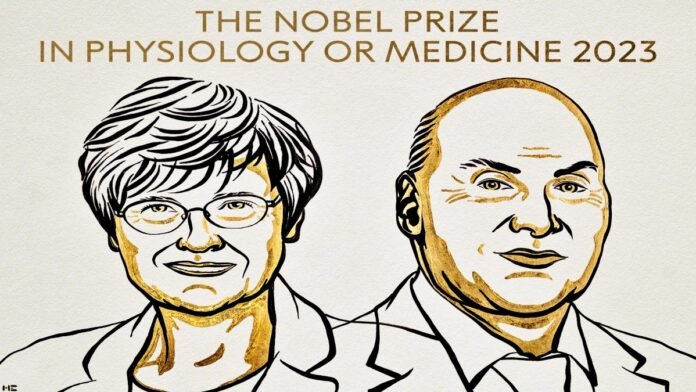
New Delhi: The Nobel Assembly at Karolinska Institutet announced on Monday that the 2023 Nobel Prize for Physiology or Medicine was jointly awarded to Katalin Kariko and Drew Weissman for their groundbreaking discoveries that enabled the development of mRNA vaccines against COVID-19 and other diseases.
Katalin Kariko is a Hungarian-American biochemist who specializes in RNA-mediated mechanisms. She is a senior vice president at BioNTech RNA Pharmaceuticals and an adjunct professor at the University of Pennsylvania.
Drew Weissman is an American physician-scientist who is the Roberts Family Professor in Vaccine Research and the director of the Penn Institute for RNA Innovation at the University of Pennsylvania. He is also a former fellow at the National Institutes of Health under the supervision of Anthony Fauci.
Kariko and Weissman met at the University of Pennsylvania in 1997 and began collaborating on the study of RNA and its potential applications for vaccines and gene therapy. They faced many challenges and setbacks, as their research was considered too risky and received little funding and recognition.
However, they persisted and made a breakthrough discovery in 2005, when they showed that synthetic nucleosides could be used to modify mRNA to reduce its immunogenicity and increase its stability. This discovery paved the way for the use of mRNA as a platform for delivering genetic instructions to cells to produce proteins that can elicit immune responses against various pathogens.
Their modified mRNA technology was licensed by BioNTech and Moderna, two biotechnology companies that developed the first authorized mRNA vaccines against COVID-19, the disease caused by the novel coronavirus SARS-CoV-2. These vaccines have shown high efficacy and safety in clinical trials and have been administered to hundreds of millions of people worldwide, helping to curb the pandemic that has claimed over 5 million lives.
The Nobel Committee praised Kariko and Weissman for their “fundamental contributions to our understanding of how mRNA interacts with our immune system” and for their “visionary work that has led to the development of novel vaccines with unprecedented speed”.
The Nobel Prize for Physiology or Medicine is one of the six Nobel Prizes established by the will of Alfred Nobel, the Swedish inventor of dynamite, in 1895. It is awarded annually to individuals or groups who have made outstanding discoveries in the fields of life sciences and medicine. The prize consists of a gold medal, a diploma, and a cash award of 10 million Swedish kronor (about 1.1 million US dollars).

The Nobel Prize for Physiology or Medicine is the first of the six Nobel Prizes to be announced this year. The other prizes are for Physics, Chemistry, Literature, Peace, and Economic Sciences. The laureates will receive their prizes at ceremonies in Stockholm and Oslo on December 10, the anniversary of Nobel’s death.







































